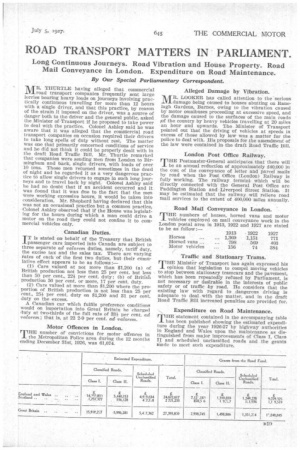ROAD TRANSPORT MATTERS IN PARLIAMENT.
Page 73

If you've noticed an error in this article please click here to report it so we can fix it.
Long Continuous Journeys. Road Vibration and House Property. Road Mail Conveyance in London. Expenditure on Road Maintenance.
By Our Special Parliamentary Correspondent.
THURTLE having alleged that commercial road transport companies frequently sent large lorries bearing heavy loads on journeys involving practically continuous travelling for more than 12 hours with a single driver, and that this practice, by reason of the strain it imposed on the driver, was a source of danger both to the driver and the general public, asked the Minister of Transport if he proposed to take power to deal with the practice. Colonel Ashley said he was aware that it was alleged that the comniercial road transport companies on occasion required their drivers to take long spells of duty without rest. The matter was one that primarily concerned conditions of service and he did not think it could be properly dealt with in the draft Road Traffic Bill. Mr. Thurtle remarked that companies were sending men from London to Birmingham and baek, single drivers, with loads of over 10 tons. Those men returned sometimes in the dead of night and he regarded it as a very dangerous practice to allow single drivers to engage in such long journeys and to travel back by night. Colonel Ashley said lie had no doubt that if an accident occurred and it was found that it was due to the fact that the men were working excessive hours, it would be taken into consideration. Mr. Shepherd having declared that this was not an occasional practice but a common practice, Colonel Ashley observed that if the House was legislating for the hours during which a man could drive a motor on the road they could not confine it to coramercial vehicles only.
Canadian Duties.
IT is stated onbehalf of the Treasury that British passenger cars imported into Canada are subject to three separate ad valorem duties, namely, tariff duty, the excise tax and the sales tax. There are varying rates of each of the first two duties, but their cumulative effect appears to be as follows :— (1) Cars valued at not more than $1,200 (a) of British production not less than 25 per cent, but less than 50 per cent., 221 per cent. duty ; (b) of British production 50 per cent, or more, 17 per cent. duty.
(2) Cars valued at more than $1,200 where the proportion of British production is not less than 25 per cent., 251 per cent, duty on $1,200 and 31 per cent. duty on the excess.
A Canadian ear which fulfils preference conditions would on importation into Great Britain be charged duty at two-thirds of the full rate of 33/ per cent, ad valorem; that is, at 22 2-9 per cent. ad valorem.
Motor Offences in London.
THE number of convictions for motor offences in the Metropolitan Police area during the 12 months ending December 31st, 1926, was 61,674. Alleged Damage by Vibration.
.j /[R. LOOKER has called attention to the serious .131damage being caused to houses abutting on Ranelagh Gardens, Barnes, owing to the vibration caused by motor omnibuses proceeding at excessive speed, and the damage caused to the surfaces of the main roads pf the country by heavy vehicles travelling at 20 miles an hour and upwards. The Minister of Transport pointed out that the driving of vehicles at speeds in excess of those allowed by law was a matter for the police to deal with. His proposals for the amendment of the law were contained in the draft Road Traffic Bill.
London Post Office Railway.
THE Postmaster-General anticipates that there will be an annual reduction of approximately f40,000 in the cost of the conveyance of letter and parcel mails by road when the Post Office (London) Railway is fully working. The railway termini. which will be directly connected with the General Post Office are Paddington Station and Liverpool Street Station. It may be estimated that the railway will relieve road mail services to the extent of 400,000 miles annually.
Road Mail Conveyance in London.
THE numbers of horses, horsed vans and motor vehicles employed on mail conveyance work in the
London postal area in 1913, 1922 and 1927 are stated
Traffic and Stationary Trams.
THE Minister of Transport has again expressed his opinion that legislation to compel moving vehicles to stop between stationary tramcars and the pavement, which has been repeatedly refused by Parliament, is not necessary or deSirable in the interests of public safety or of traffic by road. He considers that the existing law with regard to dangerous driving is adequate to deal with the matter, and in the draft Road Traffic Bill increased penalties are provided for.
Expenditure on Road Maintenance.
THE statement contained in the accompanying table has been published showing the estimated expenditure during the year 1926-27 by highway authorities in England and Wales upon the maintenance as distinguished from major improvements of Class T, Class TT and scheduled unclassified roads and the grants made to meet such expenditure.












































































































































































